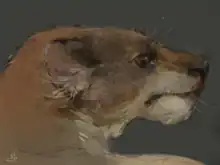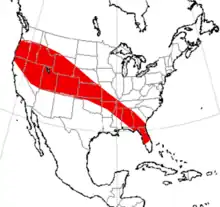| Enhydrocyon Temporal range: | |
|---|---|
_fig._6.png.webp) | |
 | |
| Scientific classification | |
| Domain: | Eukaryota |
| Kingdom: | Animalia |
| Phylum: | Chordata |
| Class: | Mammalia |
| Order: | Carnivora |
| Family: | Canidae |
| Subfamily: | †Hesperocyoninae |
| Genus: | †Enhydrocyon Cope, 1879 |
| Type species | |
| †Enhydrocyon stenocephalus | |
| Species | |
|
See text | |
 | |
| Range of Enhydrocyon fossil evidence | |
Enhydrocyon is an extinct genus of bone crushing canid which inhabited North America during the Oligocene and Early Miocene, 30.8—20.4 Ma, existing for approximately 11 million years. [1]
Enhydrocyon's dentition suggests this animal was a hypercarnivore or mesocarnivore.[2] Species of Enhydrocyon were relatively large, powerfully built carnivores with a short snout and deep jaws reminiscent of a jaguar.[3] These features give the skull a shape resembling that of the extant sea otter (Enhydra), prompting the scientific name.[4] With an estimated weight of about 10 kilograms (22 lb), this was the earliest genus of canid adapted to be specialized predators.[4]
Species
- †Enhydrocyon basilatus Cope 1879
- †E. crassidens Matthew 1907
- †E. pahinsintewakpa Macdonald 1963
- †E. sectorius Cope 1883
- †E. stenocephalus Cope 1879
References
- ↑ Enhydrocyon at fossilworks
- ↑ R. M. Nowak. 1991. Walker's Mammals of the World. Maryland, Johns Hopkins University Press (edited volume) II
- ↑ David Macdonald. The Velvet Claw: A Natural History of the Carnivores. BBC Books: London; 1992. p83.
- 1 2 Wang, Xiaoming; Tedford, Richard H. (2008). Dogs, Their Fossil Relatives and Evolutionary History. Columbia. p. 27. ISBN 978-0-231-13528-3.
- Wang, X. (1994). "Phylogenetic systematics of the Hesperocyoninae (Carnivora, Canidae)". Bulletin of the American Museum of Natural History. 221: 1–207. hdl:2246/829.
This article is issued from Wikipedia. The text is licensed under Creative Commons - Attribution - Sharealike. Additional terms may apply for the media files.